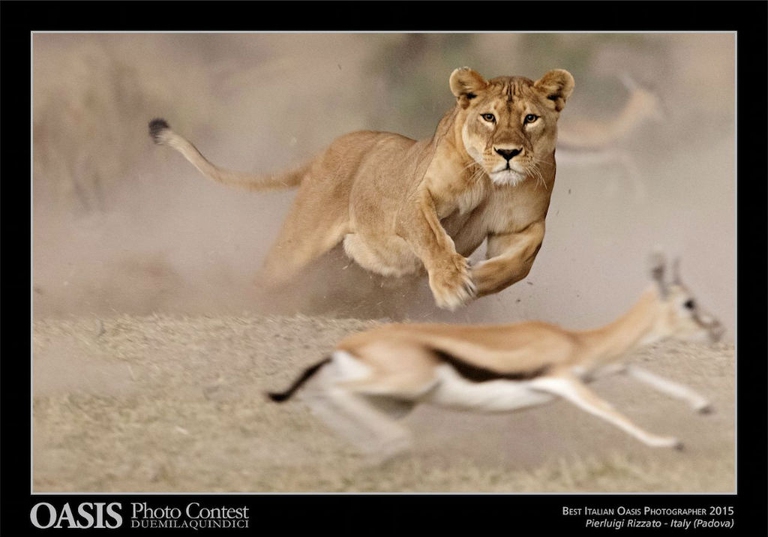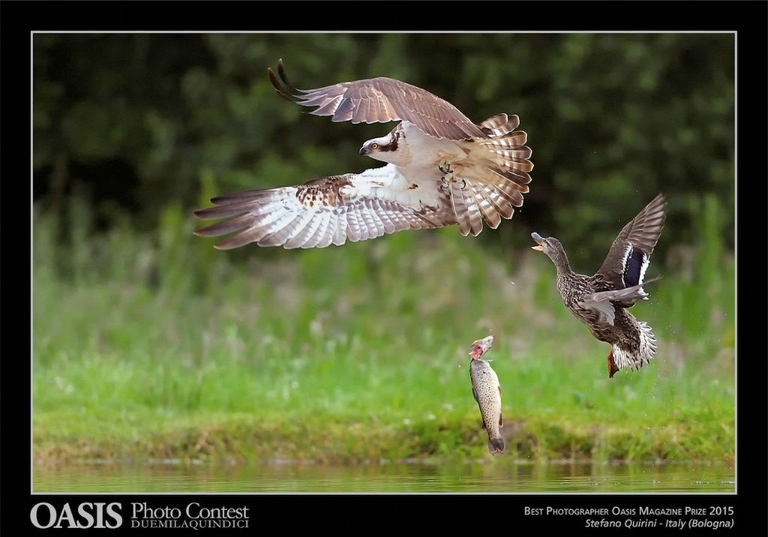
Our species took its first steps in a world covered in trees. Today, forests offer us sustenance, shelter, and clean the air that we breathe.
Premiate con l’Oscar della fotografia le 100 migliori immagini di natura, provenienti da tutto il mondo. La vita ritratta in tutta la sua magnificenza.
These are the most beautiful nature photographs of 2015, winners of the Oasis Photo Contest, organised by Oasis magazine and the Italian association of nature tourism. A hundred photos have been awarded, picked by an international jury among over 25,000 shots from all over the world.
60 international photographers portrayed the magnificence of nature and life on Earth, capturing unique instants of the most uncontaminated nature and wildlife. The 100 award-winning photos will be exhibited in many Italian and European cities during the Oasis Tour 2016.
Spanish Felipe Foncueva was awarded the first prize for his shot of a marine bird capturing a fish underwater. Pierluigi Rizzato is the Best Italian Oasis Photographer 2015 with his shot of a female lion hunting a gazelle, while another Italian, Stefano Quirini, was awarded the Best Photographer Oasis Magazine Prize, with the unusual image of a duck attacking an osprey.
Three photographers were awarded per category: Landscape, Mammals, Birds, Birds, Other Animals, Storyboard, People, Plants, Underwater, and Pets. There are also the Baby category (dedicated kids under 14) and the Junior category (under 18).
The award ceremony will be held in the mediaeval village of Chiaverano, Turin, Italy, from 20 to 22 May. The event will be organised by Oasis Head Editor Alessandro Cecchi Paone. Exhibitions, workshops, meetings, and excursions will be organised during the event.
Siamo anche su WhatsApp. Segui il canale ufficiale LifeGate per restare aggiornata, aggiornato sulle ultime notizie e sulle nostre attività.
![]()
Quest'opera è distribuita con Licenza Creative Commons Attribuzione - Non commerciale - Non opere derivate 4.0 Internazionale.
Our species took its first steps in a world covered in trees. Today, forests offer us sustenance, shelter, and clean the air that we breathe.
Poachers in Africa are encroaching on wildlife land and killing rhinos in travel hot spots now devoid of visitors due to the coronavirus pandemic.
Actor and environmental activist Leonardo DiCaprio has contributed two million dollars to a fund to protect Virunga National Park in Congo from threats such as terrorism, the coronavirus and poaching.
For the first time in seventeen years, Iceland’s two main whaling companies won’t resume whale hunting. The announcement concerns this year’s season but could carry into the future.
The relationship between the coronavirus and wildlife is complex: while the pandemic may lead to a reduction in the illegal trade in wild animals, it may also encourage it in other respects.
The largest coral reef in the world is severely threatened by climate change, but researchers are developing strategies that could contribute to saving the Great Barrier Reef.
NGO Free the Bears has opened a mountain sanctuary for moon bears in Laos. With the government’s help, it aims to close all bile farms by 2022.
Seychelles have extended its marine protected area, which now covers over 400,000 square kilometres, an area larger than Germany.
The tapir was reintroduced into Brazil’s Atlantic Forest, the country’s most at-risk ecosystem. The species can play a key role in the forest’s recovery.









